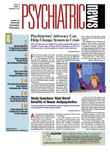Intensifying depression outreach and education initiatives will fill a critical gap in African-American communities and help combat the stigma that keeps so many from receiving needed treatment.
This was the message delivered by panelists of the Depression is Real coalition. The coalition, of which the American Psychiatric Foundation is a member, is an advocacy group of medical and civic professionals dedicated to combating the stigma of mental illness and promoting the effectiveness of treatment. The seminar, titled “Black Women Surviving Unmet Mental Health Needs,” was organized by the coalition and the Congressional Black Caucus Foundation in conjunction with Rep. Julia Carson (D-Ind.), a mental health advocate who has a family member with serious mental illness.
Panelists discussed the implications of unmet mental health needs among black women in September in Washington, D.C., and agreed that more must be done to reverse the trend of underrecognition and undertreatment of depression in that population.
“Minorities experience mental illness at disproportionate rates,” noted American Psychiatric Foundation President Altha Stewart, M.D. “They are disproportionately lacking in access to mental health treatment,” and when they do receive treatment, it is more likely to be inadequate compared with treatment received by nonminorities, she said.
She also pointed out that African Americans have increased rates of certain diseases that often go hand in hand with depression, such as hypertention, cardiovascular diseases, and certain types of cancer.
“There is also a risk of increased depression in African-American women related to psychosocial, economic, and environmental stressors,” Stewart noted.
Blending depression screening and education with other health initiatives in minority populations—maternal and child health, infant mortality, or HIV/AIDS prevention for instance—is one way to improve rates of successful depression treatment, she said.
In addition, it is crucial that mental health professionals and treatment advocates partner with traditionally black social organizations so that they can be sure that their messages are heard. Such organizations may include the National Urban League, the National Association for the Advancement of Colored People, and local churches. “We don't do enough to promote an image of hope and recovery for black women with depression,” she said.
One reason African Americans may receive substandard treatment is that mental health care providers of other races may not be trained in the cultural issues impacting the lives of African Americans and because there is a shortage of African-American psychiatrists and psychologists in the United States.
Stewart and Rahn Bailey, M.D., chair of the National Medical Association's Section on Psychiatry and Behavioral Science and CEO of Bailey Psychiatric Associates in League City, Texas, noted that there are only about 2,000 black psychiatrists in the United States.
Stigma surrounding mental illness and depression may be compounded in African Americans, he said, by social and cultural factors unique to the African-American experience, which include strongly held religious beliefs, distrust of the medical profession, and the legacy of racism and suffering. Bailey said that depression is not discussed openly in many black communities.
“Recognizing that depression exists in our communities is the first step” to recovery, he noted. But mood disorders such as depression are vastly underdiagnosed in African Americans, even though they often suffer from severe forms of the disorders.
He cited results from a study by David Williams, Ph.D., published in the March Archives of General Psychiatry showing that a higher proportion of African Americans (56.5 percent) with depression rated their depression as severe or very severe than did Caucasians (38.6 percent).
He echoed Stewart's concern that many psychiatrists may be inadequately prepared to deal with cultural issues impacting African-American patients. He noted as well that African Americans may metabolize psychotropic medications at different rates than do people of other races, but that some psychiatrists may not take this into account.
Bailey also pointed out that only about half of African Americans have health insurance plans that cover mental health treatment and that they are more likely to be enrolled in so-called “low-income” insurance plans such as Medicaid, which require high copays for mental health services.
Mental health advocate and author of Black Pain: It Just Looks Like We're Not Hurting, Terri Williams, L.C.S.W., noted that black women have a “supposed birthright to strength—we're supposed to be strong, nurturers, caretakers, and healers of other people.”
Williams commented on the fact that the signs of depression are often unacknowledged by black women experiencing them. Black women suffer every day, she said, “because we really don't know what our pain looks like. .or what it feels like.”
She spoke from experience. As someone who struggled with depression for decades, she described the nadir of her depression: “I could barely get out of bed. I would lie there in the fetal position and cry,” she noted.
Williams said that she is doing well in treatment. ▪

